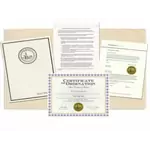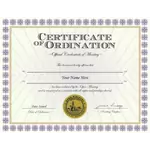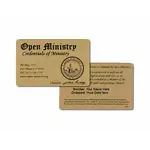State Marriage Laws and Information
Since 2010, Open Ministry has been ordaining and helping people all over the world perform weddings, ceremony and other sacerdotal duties. This page focuses on requirements and information for Maryland; Scroll down to the bottom of the page for links to other states.
How to get ordained and perform a wedding in Maryland
If you are planning to get ordained in Maryland or you have been asked to perform a wedding ceremony in Maryland, or simply need to to find an ordained minister in Maryland to perform your wedding ceremony.
This ordination information forMaryland is provided below in an easy five step layout which is designed help walk you through the most common steps on registering to become a minister for Maryland and how perform a wedding ceremony in Maryland.
Step 1 - Get Ordained Online for free with Open Ministry
Step 1: Get Ordained in Maryland with Open Ministry
Becoming an ordained minister in Maryland is completely free and fully online with Open Ministry. In under 3 hours you’ll receive your ordination confirmation by email. Printed hard-copy certificates are available at our bookstore - empowering you to officiate weddings and marriage ceremonies anywhere in Maryland.
When you get ordained in Maryland through Open Ministry, you’ll enjoy:
- Quick online ordination - apply anytime, from any device.
- Free lifetime ordination - complete in under 5 hours.
- Optional printed certificates - available at our bookstore.
- Statewide acceptance - recognized in every Maryland county.
- Unlimited officiant rights - weddings, vow renewals, and more.
How It Works
- Click the Get Ordained in Maryland button below.
- Complete our secure online ordination form.
- Receive your free ordination and order printed certificates for your records.
As a fully ordained minister in Maryland, you’ll hold legal authority to create memorable wedding experiences and solemnize marriages across the state.
Get Ordained in Maryland Today
Open Ministry ordination is free and fast-printed certificates available for purchase. Start now!
Step 2 - Contact The County Clerk
How to Register to Officiate a Marriage in Maryland
Next, contact the office of your local marriage authority (typically your county clerk in Maryland). Let them know that you are a ordained minister with Open Ministry in California, and ask them what information the will require of you, to officiate a marriage in Maryland. Most clerks and governing agencies may require that you present them with a physical copy of your ordination record.
When speaking with the county clerk; it can be helpful to use the following phrases.
- What agency or department issues marriage licenses in your county and how may I contact them?
- I am an ordained minister with a church in California and I would like to register as a wedding Officiant in your county to perform and solemnize weddings.
- I have my Letter of Good Standing and/or Ordination Credential as proof of my ministry and ordination.
- What additional documentation is required for me to register as a wedding Officiant in your county or state?
Step 3 - Get registered to perform a Marriage
License to perform a wedding in Maryland
After you've contacted your marriage authority, you will want to visit our bookstore to get physical copies official credentials for presentation and your records. (See Maryland State Statutes for More Specific Requirements )
When registering in Maryland you may be asked to display proof of your ordination to the county clerk's before they will accept the marriage license as having been legally solemnized. We typically advise ministers of Maryland to get a Complete Minister Package for Maryland which includes your Letter of Good Standing (the live signed and notarized physical copy of your standing with our ministry).
Having your physical copies credentials provides peace-of-mind to couples and others that you intend to marry. Additionally, we recommend at least 4 weeks between the date of the wedding ceremony and your order, to ensure that you receive all of your materials and are able to register in time. Please note that every state and county can impose different requirements. This may include other nominal fees and additional paperwork that may need to be completed before the ceremony can take place.
It is important to note that some county clerks in Maryland may require wedding officiants to attach a statement which asserts some of the elements in the marriage license upon submission, including the following:
- The time and location at which the wedding took place
- The names and places of residence of all official witnesses
- The religious organization in which the officiant is ordained
- The printed name and address of the officiant
Please note that, when filling out a marriage license, that Maryland State may request you use the title "Minister" or "Reverend". The County Clerks may also require you enter your denomination, you can use "Non-Denominational". Failing to state a denomination may result in rejection and could require a duplicate marriage license.
Step 4 - How to Perform the Wedding
How to perform a wedding in Maryland
Once you have completed of the above, you are ready to perform the wedding! Be sure that the couple has picked up their Maryland state issued marriage license from the appropriate office. Maryland marriage licenses valid for a set number of days, and there may be a waiting period between when the couple receives the marriage license in Maryland and when the ceremony may be legally performed in Maryland. This information should be written on the license and followed to ensure the ceremony is recorded properly.
Please be aware that the signed license must be returned to the issuing office in Maryland before the time limit is reached. Check the marriage license for the exact dates. Once the the previous matters have been addressed, officiating a wedding in Maryland can be a great and wonderful experience.
If you have any comments or issues as a wedding officiant in Maryland, or after you have been ordained, or would like to just asking for guidance on how to perform a wedding ceremony in Maryland. We recommend that all new Maryland wedding ministers who have issues or concerns about the ceremony read over our helpful guides.
Maryland
2-406 Performance of ceremony
(a) Authorized officials.-
(1) In this subsection, "judge" means:
(i) a judge of the District Court, a circuit court, the Court of Special Appeals, or the Court of Appeals;
(ii) a judge approved under Article IV, § 3A of the Maryland Constitution and § 1-302 of the Courts Article for recall and assignment to the District Court, a circuit court, the Court of Special Appeals, or the Court of Appeals;
(iii) a judge of a United States District Court, a United States Court of Appeals, or the United States Tax Court; or
(iv) a judge of a state court if the judge is active or retired but eligible for recall.
(2) A marriage ceremony may be performed in this State by:
(i) any official of a religious order or body authorized by the rules and customs of that order or body to perform a marriage ceremony;
(ii) any clerk;
(iii) any deputy clerk designated by the county administrative judge of the circuit court for the county; or
(iv) a judge.
(b) Period during which ceremony may be performed.- Within 6 months after a license becomes effective, any authorized official may perform the marriage ceremony of the individuals named in the license.
(c) Performance by unauthorized individual prohibited; penalty.-
(1) An individual may not perform a marriage ceremony unless the individual is authorized to perform a marriage ceremony under subsection (a) of this section.
(2) An individual who violates this subsection is guilty of a misdemeanor and on conviction is subject to a fine of $500.
(d) Performance between individuals within prohibited degrees prohibited; penalty.-
(1) An individual may not knowingly perform a marriage ceremony between individuals who are prohibited from marrying under § 2-202 of this title.
(2) An individual who violates the provisions of this subsection is guilty of a misdemeanor and on conviction is subject to a fine of $500.
(e) Performance without license prohibited; penalty.-
(1) An individual may not perform a marriage ceremony without a license that is effective under this subtitle.
(2) An individual who violates the provisions of this subsection is guilty of a misdemeanor and on conviction is subject to a fine not exceeding $500.
(f) Ceremony performed by a clerk or deputy clerk.- The county administrative judge of the circuit court for the county shall designate:
(1) when and where the clerk or deputy clerk may perform a marriage ceremony; and
(2) the form of the marriage ceremony to be recited by the clerk or deputy clerk and the parties being married.
(g) Forms of religious ceremonies.- This section does not affect the right of any religious denomination to perform a marriage ceremony in accordance with the rules and customs of the denomination.
Family Law - Title 2. Marriage - Subtitle 4: Licensing and Performance
[An. Code 1957, art. 27, §§ 392, 394; art. 62, §§ 3A, 4, 15; 1984, ch. 296, § 2; 1999, ch. 336, § 2; 2002, ch. 207; 2004, ch. 199; 2009, ch. 324.]












